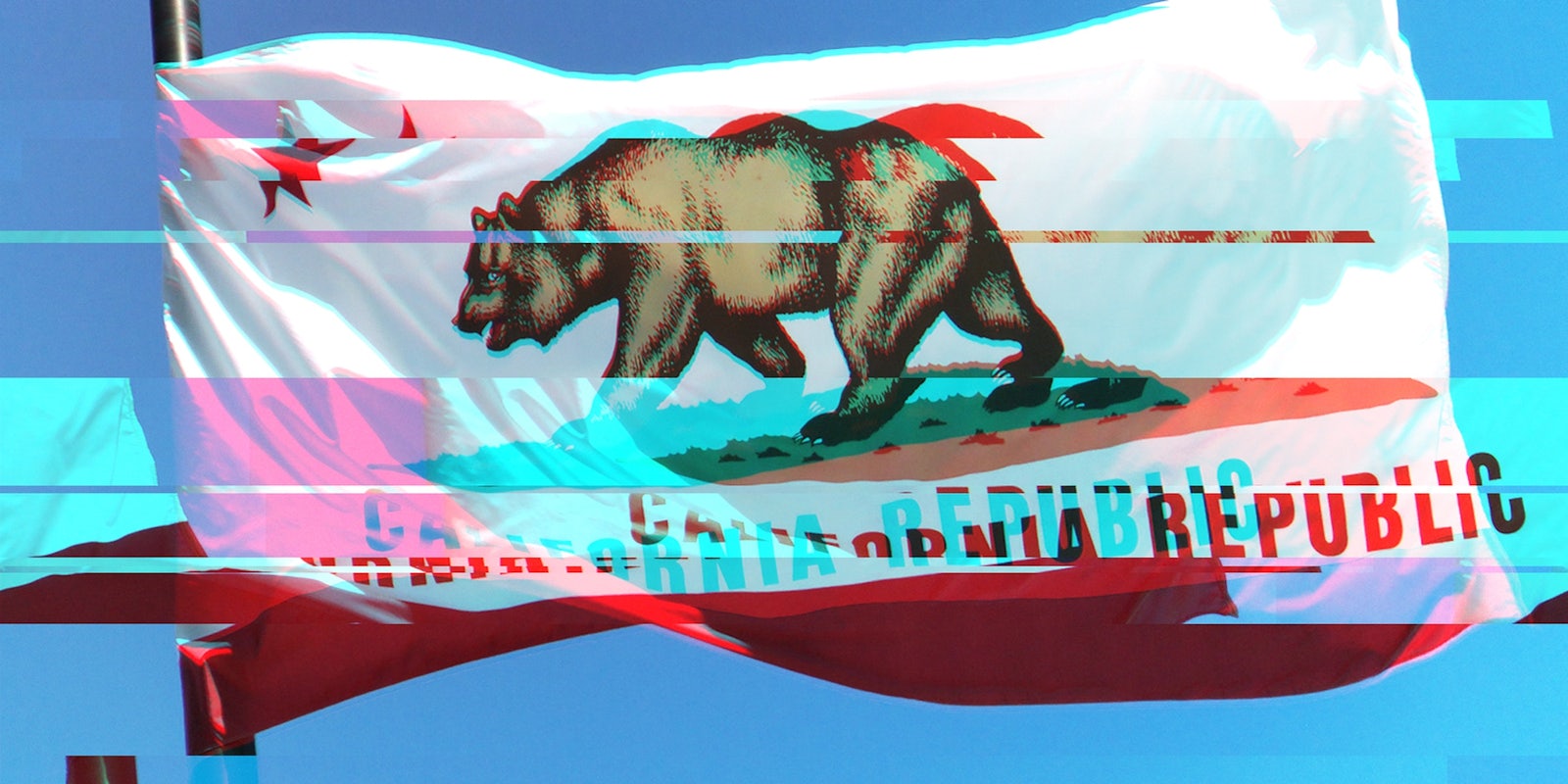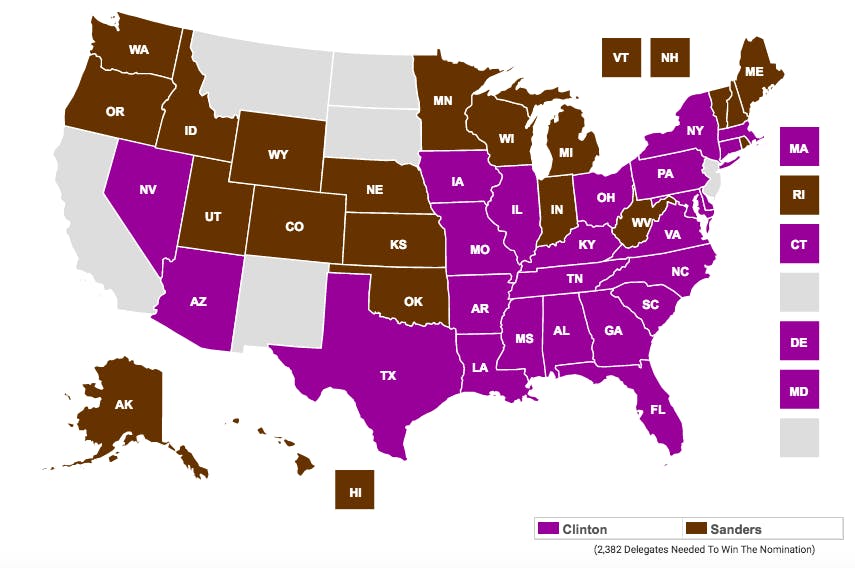Yes, there’s still reason to pay attention to the California primary.
It’s true that the 2016 election‘s primary season will be all but over by the time polls close in California on Tuesday night. No matter what happens in California, Hillary Clinton effectively has the Democratic Party’s nomination in the bag. Clinton’s victory in Puerto Rico on Saturday leaves her 26 delegates short of the 2,383 delegates she’ll need to defeat rival Bernie Sanders, according to the Associated Press. Five other states hold their remaining contests on Tuesday, with one East Coast state, New Jersey, likely to push Clinton over the finish line while votes are still being counted in the Golden State.
Meanwhile, there’s a chance Sanders could pull off an upset victory in California—and that’s where things could get interesting.
A lack of funds and superdelegates hasn’t stopped the Vermont senator from staying competitive. Sanders has vowed not to concede even when Clinton reaches the 2,383-delegate threshold, and he may force the Democrats to hold a contested convention.
There’s a chance Sanders could pull off an upset victory in California—and that’s where things could get interesting.
Sanders has been campaigning hard in the state for much of the latter half of May and is nearly outspending Clinton in ad buys. His roughly two dozen rallies in California in May have drawn a total of more than 160,000 people, and his largest rally (60,000 in Oakland, California) outnumbered even the largest of President Barack Obama‘s in 2008. The latest Real Clear Politics average gives Clinton a narrow two-point lead over Sanders in the state. Compare this to the 19-point lead that Clinton, Obama’s former secretary of state, had over Sanders in one KABC/SurveyUSA poll from April.
It’s true that losing California wouldn’t heavily impact Clinton numbers-wise. But the loss of the Democratic stronghold would be troubling foreshadowing for Clinton’s fate in the general election, which is why she returned to campaign there last week instead of any of the five other states that will hold contests on June 7. As Politico points out, even a tight race in California—a state that Clinton won in 2008 and that husband and former President Bill Clinton won in 1992—could signal to some in the party that she is no longer a decisive winner.
Which states have Clinton and Sanders won so far?
If you’d like to figure out whether a state went for Sanders or Clinton in the race so far, ask yourself two questions: Does the state have cold winters? Is the population predominantly white?
With the exception of Hawaii, Sanders has only won in predominantly white states in the North. Meanwhile, Southern states with large black and/or Hispanic populations like Alabama, Arizona, and Texas have flocked to Clinton. Not only would losing a state as large, progressive, and demographically diverse as California be embarrassing for Clinton, it would indicate that Sanders’s infamous lack of appeal with voters of color has turned the corner.
What’s the significance of the California primary?
There’s an irony to California holding the largest number of delegates for both Republicans (172) and Democrats (475). California hasn’t been important in presidential nominations in a very long time. As NPR points out, the delegate-heavy state has not been the tipping factor in a candidate losing or winning the Democratic party’s nomination since 1972 and the Republican nomination since 1964.
Democrat George McGovern’s 1972 win in California gave him enough delegates to secure the Democratic nomination, even though challenger Hubert Humphrey won the popular vote. (Notably, California in 1972 was a “winner-take-all” state; today, Democratic delegates in all states are largely awarded proportionally, based on the popular vote.)
Clinton currently has a 3 million-vote lead over Sanders. A strong performance by Sanders in California could lead to him winning the popular vote but still leave Clinton with the highest number of delegates overall.
Voter turnout for the California primary this year is expected to be huge. A record 18 million Californians are eligible to vote in Tuesday’s primary, according to local news outlet Fox40. Voters won’t just be turning up to the polls for Sanders and Clinton. A rare open U.S. Senate seat in California is up for grabs due to departing Democratic Sen. Barbara Boxer. The winner in that contest is widely expected to be State Attorney General Kamala Harris.
What does California look like, politically?
Go any more left than California, and you’ll hit the Pacific Ocean. According to a May poll by the Public Policy Institute of California, an estimated 6 in 10 Californians approve of President Obama. Around 90 percent of Californians favor a path to citizenship for undocumented immigrants, and nearly three-quarters oppose presumptive Republican nominee Donald Trump‘s plan to build a wall over Mexico. Both Sanders and Clinton would win California in a matchup with Trump, according to polls in the state, though Sanders’s victory would be by a slightly wider margin.
Among likely Democrat voters, Clinton has a two-point lead over Sanders. Among registered Democrats in the PPIC poll, Clinton has an eight-point lead over Sanders, identical to her lead over Obama in 2008. The gap between likely and registered Democrats reflects the addition of Independent voters who said they would vote in the June 7 primary. California election laws allow unaffiliated voters to register to vote in the Democratic primary. Members of actual parties, however, such as the American Independent or Green party, are not eligible to vote in the Democratic primary. This policy may have led some California voters to switch parties in time for the Democratic primary. A record number (nearly 3 out of every 4) of new voters in California registered as Democrats, according to the Los Angeles Times.
If you look at the party breakdown of California, note the mysterious loss of thousands of members of the American Independent, Green, and Peace and Freedom parties that happened between April and May:
Republicans and minor parties in CA lost market share, so to speak, in final surge of voters. Dems now +17 over GOP pic.twitter.com/1ZYwoysoNT
— John Myers (@johnmyers) June 3, 2016
Which other states will hold contests on Tuesday?
In addition to California, five other states will hold contests on June 7: Montana, New Jersey, New Mexico, North Dakota, and South Dakota.
The total delegate counts for each state (including superdelegates) are as follows:
Montana: 27
New Jersey: 142
New Mexico: 43
North Dakota: 23
South Dakota: 25
The District of Columbia will be the last and final presidential primary of the 2016 election, holding its contest for Democrats on June 14.
It’s likely Sanders will win in Montana given he won in neighboring Idaho and Wyoming. New Mexico and New Jersey will likely go to Clinton, who is leading in polls in both states.
What’s the current delegate breakdown?
Here’s the current delegate count for both Democratic candidates, according to RealClearPolitics:
Sanders
Pledged: 1,520
Superdelegates: 46
Total delegates: 1,566
Clinton
Pledged: 1,809
Superdelegates: 548
Total delegates: 2,357

